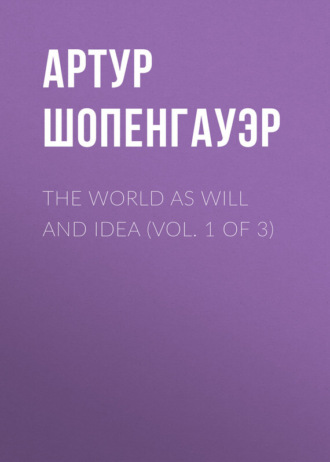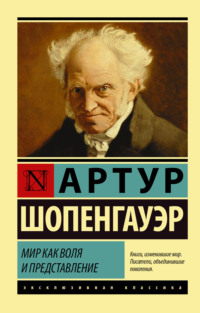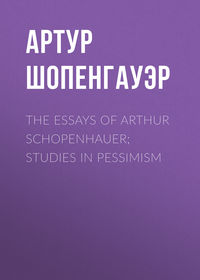 полная версия
полная версияThe World as Will and Idea (Vol. 1 of 3)
We saw that the inner being of unconscious nature is a constant striving without end and without rest. And this appears to us much more distinctly when we consider the nature of brutes and man. Willing and striving is its whole being, which may be very well compared to an unquenchable thirst. But the basis of all willing is need, deficiency, and thus pain. Consequently, the nature of brutes and man is subject to pain originally and through its very being. If, on the other hand, it lacks objects of desire, because it is at once deprived of them by a too easy satisfaction, a terrible void and ennui comes over it, i. e., its being and existence itself becomes an unbearable burden to it. Thus its life swings like a pendulum backwards and forwards between pain and ennui. This has also had to express itself very oddly in this way; after man had transferred all pain and torments to hell, there then remained nothing over for heaven but ennui.
But the constant striving which constitutes the inner nature of every manifestation of will obtains its primary and most general foundation at the higher grades of objectification, from the fact that here the will manifests itself as a living body, with the iron command to nourish it; and what gives strength to this command is just that this body is nothing but the objectified will to live itself. Man, as the most complete objectification of that will, is in like measure also the most necessitous of all beings: he is through and through concrete willing and needing; he is a concretion of a thousand necessities. With these he stands upon the earth, left to himself, uncertain about everything except his own need and misery. Consequently the care for the maintenance of that existence under exacting demands, which are renewed every day, occupies, as a rule, the whole of human life. To this is directly related the second claim, that of the propagation of the species. At the same time he is threatened from all sides by the most different kinds of dangers, from which it requires constant watchfulness to escape. With cautious steps and casting anxious glances round him he pursues his path, for a thousand accidents and a thousand enemies lie in wait for him. Thus he went while yet a savage, thus he goes in civilised life; there is no security for him.
“Qualibus in tenebris vitæ, quantisque periclisDegitur hocc' ævi, quodcunque est!” – Lucr. ii. 15.The life of the great majority is only a constant struggle for this existence itself, with the certainty of losing it at last. But what enables them to endure this wearisome battle is not so much the love of life as the fear of death, which yet stands in the background as inevitable, and may come upon them at any moment. Life itself is a sea, full of rocks and whirlpools, which man avoids with the greatest care and solicitude, although he knows that even if he succeeds in getting through with all his efforts and skill, he yet by doing so comes nearer at every step to the greatest, the total, inevitable, and irremediable shipwreck, death; nay, even steers right upon it: this is the final goal of the laborious voyage, and worse for him than all the rocks from which he has escaped.
Now it is well worth observing that, on the one hand, the suffering and misery of life may easily increase to such an extent that death itself, in the flight from which the whole of life consists, becomes desirable, and we hasten towards it voluntarily; and again, on the other hand, that as soon as want and suffering permit rest to a man, ennui is at once so near that he necessarily requires diversion. The striving after existence is what occupies all living things and maintains them in motion. But when existence is assured, then they know not what to do with it; thus the second thing that sets them in motion is the effort to get free from the burden of existence, to make it cease to be felt, “to kill time,” i. e., to escape from ennui. Accordingly we see that almost all men who are secure from want and care, now that at last they have thrown off all other burdens, become a burden to themselves, and regard as a gain every hour they succeed in getting through; and thus every diminution of the very life which, till then, they have employed all their powers to maintain as long as possible. Ennui is by no means an evil to be lightly esteemed; in the end it depicts on the countenance real despair. It makes beings who love each other so little as men do, seek each other eagerly, and thus becomes the source of social intercourse. Moreover, even from motives of policy, public precautions are everywhere taken against it, as against other universal calamities. For this evil may drive men to the greatest excesses, just as much as its opposite extreme, famine: the people require panem et circenses. The strict penitentiary system of Philadelphia makes use of ennui alone as a means of punishment, through solitary confinement and idleness, and it is found so terrible that it has even led prisoners to commit suicide. As want is the constant scourge of the people, so ennui is that of the fashionable world. In middle-class life ennui is represented by the Sunday, and want by the six week-days.
Thus between desiring and attaining all human life flows on throughout. The wish is, in its nature, pain; the attainment soon begets satiety: the end was only apparent; possession takes away the charm; the wish, the need, presents itself under a new form; when it does not, then follows desolateness, emptiness, ennui, against which the conflict is just as painful as against want. That wish and satisfaction should follow each other neither too quickly nor too slowly reduces the suffering, which both occasion to the smallest amount, and constitutes the happiest life. For that which we might otherwise call the most beautiful part of life, its purest joy, if it were only because it lifts us out of real existence and transforms us into disinterested spectators of it – that is, pure knowledge, which is foreign to all willing, the pleasure of the beautiful, the true delight in art – this is granted only to a very few, because it demands rare talents, and to these few only as a passing dream. And then, even these few, on account of their higher intellectual power, are made susceptible of far greater suffering than duller minds can ever feel, and are also placed in lonely isolation by a nature which is obviously different from that of others; thus here also accounts are squared. But to the great majority of men purely intellectual pleasures are not accessible. They are almost quite incapable of the joys which lie in pure knowledge. They are entirely given up to willing. If, therefore, anything is to win their sympathy, to be interesting to them, it must (as is implied in the meaning of the word) in some way excite their will, even if it is only through a distant and merely problematical relation to it; the will must not be left altogether out of the question, for their existence lies far more in willing than in knowing, – action and reaction is their one element. We may find in trifles and everyday occurrences the naïve expressions of this quality. Thus, for example, at any place worth seeing they may visit, they write their names, in order thus to react, to affect the place since it does not affect them. Again, when they see a strange rare animal, they cannot easily confine themselves to merely observing it; they must rouse it, tease it, play with it, merely to experience action and reaction; but this need for excitement of the will manifests itself very specially in the discovery and support of card-playing, which is quite peculiarly the expression of the miserable side of humanity.
But whatever nature and fortune may have done, whoever a man be and whatever he may possess, the pain which is essential to life cannot be thrown off: – Πηλειδης δ᾽ ῳμωξεν, ιδων εις ουρανον ευρυν (Pelides autem ejulavit, intuitus in cælum latum). And again: – Ζηνος μεν παις ηα Κρονιονος, αυταρ οιζυν ειχον απειρεσιην (Jovis quidem filius eram Saturnii; verum ærumnam habebam infinitam). The ceaseless efforts to banish suffering accomplish no more than to make it change its form. It is essentially deficiency, want, care for the maintenance of life. If we succeed, which is very difficult, in removing pain in this form, it immediately assumes a thousand others, varying according to age and circumstances, such as lust, passionate love, jealousy, envy, hatred, anxiety, ambition, covetousness, sickness, &c., &c. If at last it can find entrance in no other form, it comes in the sad, grey garments of tediousness and ennui, against which we then strive in various ways. If finally we succeed in driving this away, we shall hardly do so without letting pain enter in one of its earlier forms, and the dance begin again from the beginning; for all human life is tossed backwards and forwards between pain and ennui. Depressing as this view of life is, I will draw attention, by the way, to an aspect of it from which consolation may be drawn, and perhaps even a stoical indifference to one's own present ills may be attained. For our impatience at these arises for the most part from the fact that we regard them as brought about by a chain of causes which might easily be different. We do not generally grieve over ills which are directly necessary and quite universal; for example, the necessity of age and of death, and many daily inconveniences. It is rather the consideration of the accidental nature of the circumstances that brought some sorrow just to us, that gives it its sting. But if we have recognised that pain, as such, is inevitable and essential to life, and that nothing depends upon chance but its mere fashion, the form under which it presents itself, that thus our present sorrow fills a place that, without it, would at once be occupied by another which now is excluded by it, and that therefore fate can affect us little in what is essential; such a reflection, if it were to become a living conviction, might produce a considerable degree of stoical equanimity, and very much lessen the anxious care for our own well-being. But, in fact, such a powerful control of reason over directly felt suffering seldom or never occurs.
Besides, through this view of the inevitableness of pain, of the supplanting of one pain by another, and the introduction of a new pain through the passing away of that which preceded it, one might be led to the paradoxical but not absurd hypothesis, that in every individual the measure of the pain essential to him was determined once for all by his nature, a measure which could neither remain empty, nor be more than filled, however much the form of the suffering might change. Thus his suffering and well-being would by no means be determined from without, but only through that measure, that natural disposition, which indeed might experience certain additions and diminutions from the physical condition at different times, but yet, on the whole, would remain the same, and would just be what is called the temperament, or, more accurately, the degree in which he might be ευκολος or δυσκολος, as Plato expresses it in the First Book of the Republic, i. e., in an easy or difficult mood. This hypothesis is supported not only by the well-known experience that great suffering makes all lesser ills cease to be felt, and conversely that freedom from great suffering makes even the most trifling inconveniences torment us and put us out of humour; but experience also teaches that if a great misfortune, at the mere thought of which we shuddered, actually befalls us, as soon as we have overcome the first pain of it, our disposition remains for the most part unchanged; and, conversely, that after the attainment of some happiness we have long desired, we do not feel ourselves on the whole and permanently very much better off and agreeably situated than before. Only the moment at which these changes occur affects us with unusual strength, as deep sorrow or exulting joy, but both soon pass away, for they are based upon illusion. For they do not spring from the immediately present pleasure or pain, but only from the opening up of a new future which is anticipated in them. Only by borrowing from the future could pain or pleasure be heightened so abnormally, and consequently not enduringly. It would follow, from the hypothesis advanced, that a large part of the feeling of suffering and of well-being would be subjective and determined a priori, as is the case with knowing; and we may add the following remarks as evidence in favour of it. Human cheerfulness or dejection are manifestly not determined by external circumstances, such as wealth and position, for we see at least as many glad faces among the poor as among the rich. Further, the motives which induce suicide are so very different, that we can assign no motive that is so great as to bring it about, even with great probability, in every character, and few that would be so small that the like of them had never caused it. Now although the degree of our serenity or sadness is not at all times the same, yet, in consequence of this view, we shall not attribute it to the change of outward circumstances, but to that of the inner condition, the physical state. For when an actual, though only temporary, increase of our serenity, even to the extent of joyfulness, takes place, it usually appears without any external occasion. It is true that we often see our pain arise only from some definite external relation, and are visibly oppressed and saddened by this only. Then we believe that if only this were taken away, the greatest contentment would necessarily ensue. But this is illusion. The measure of our pain and our happiness is on the whole, according to our hypothesis, subjectively determined for each point of time, and the motive for sadness is related to that, just as a blister which draws to a head all the bad humours otherwise distributed is related to the body. The pain which is at that period of time essential to our nature, and therefore cannot be shaken off, would, without the definite external cause of our suffering, be divided at a hundred points, and appear in the form of a hundred little annoyances and cares about things which we now entirely overlook, because our capacity for pain is already filled by that chief evil which has concentrated in a point all the suffering otherwise dispersed. This corresponds also to the observation that if a great and pressing care is lifted from our breast by its fortunate issue, another immediately takes its place, the whole material of which was already there before, yet could not come into consciousness as care because there was no capacity left for it, and therefore this material of care remained indistinct and unobserved in a cloudy form on the farthest horizon of consciousness. But now that there is room, this prepared material at once comes forward and occupies the throne of the reigning care of the day (πρυτανευουσα). And if it is very much lighter in its matter than the material of the care which has vanished, it knows how to blow itself out so as apparently to equal it in size, and thus, as the chief care of the day, completely fills the throne.
Excessive joy and very keen suffering always occur in the same person, for they condition each other reciprocally, and are also in common conditioned by great activity of the mind. Both are produced, as we have just seen, not by what is really present, but by the anticipation of the future. But since pain is essential to life, and its degree is also determined by the nature of the subject, sudden changes, because they are always external, cannot really alter its degree. Thus an error and delusion always lies at the foundation of immoderate joy or grief, and consequently both these excessive strainings of the mind can be avoided by knowledge. Every immoderate joy (exultatio, insolens lætitia) always rests on the delusion that one has found in life what can never be found there – lasting satisfaction of the harassing desires and cares, which are constantly breeding new ones. From every particular delusion of this kind one must inevitably be brought back later, and then when it vanishes must pay for it with pain as bitter as the joy its entrance caused was keen. So far, then, it is precisely like a height from which one can come down only by a fall. Therefore one ought to avoid them; and every sudden excessive grief is just a fall from some such height, the vanishing of such a delusion, and so conditioned by it. Consequently we might avoid them both if we had sufficient control over ourselves to survey things always with perfect clearness as a whole and in their connection, and steadfastly to guard against really lending them the colours which we wish they had. The principal effort of the Stoical ethics was to free the mind from all such delusion and its consequences, and to give it instead an equanimity that could not be disturbed. It is this insight that inspires Horace in the well-known ode —
“Æquam memento rebus in arduiisServare mentem, non secus in bonisAb insolenti temperatamLætitia.”For the most part, however, we close our minds against the knowledge, which may be compared to a bitter medicine, that suffering is essential to life, and therefore does not flow in upon us from without, but that every one carries about with him its perennial source in his own heart. We rather seek constantly for an external particular cause, as it were, a pretext for the pain which never leaves us, just as the free man makes himself an idol, in order to have a master. For we unweariedly strive from wish to wish; and although every satisfaction, however much it promised, when attained fails to satisfy us, but for the most part comes presently to be an error of which we are ashamed, yet we do not see that we draw water with the sieve of the Danaides, but ever hasten to new desires.
“Sed, dum abest quod avemus, id exsuperare videturCætera; post aliud, quum contigit illud, avemus;Et sitis æqua tenet vitai semper hiantes.” – Lucr. iii. 1095.Thus it either goes on for ever, or, what is more rare and presupposes a certain strength of character, till we reach a wish which is not satisfied and yet cannot be given up. In that case we have, as it were, found what we sought, something that we can always blame, instead of our own nature, as the source of our suffering. And thus, although we are now at variance with our fate, we are reconciled to our existence, for the knowledge is again put far from us that suffering is essential to this existence itself, and true satisfaction impossible. The result of this form of development is a somewhat melancholy disposition, the constant endurance of a single great pain, and the contempt for all lesser sorrows or joys that proceeds from it; consequently an already nobler phenomenon than that constant seizing upon ever-new forms of illusion, which is much more common.
§ 58. All satisfaction, or what is commonly called happiness, is always really and essentially only negative, and never positive. It is not an original gratification coming to us of itself, but must always be the satisfaction of a wish. The wish, i. e., some want, is the condition which precedes every pleasure. But with the satisfaction the wish and therefore the pleasure cease. Thus the satisfaction or the pleasing can never be more than the deliverance from a pain, from a want; for such is not only every actual, open sorrow, but every desire, the importunity of which disturbs our peace, and, indeed, the deadening ennui also that makes life a burden to us. It is, however, so hard to attain or achieve anything; difficulties and troubles without end are opposed to every purpose, and at every step hindrances accumulate. But when finally everything is overcome and attained, nothing can ever be gained but deliverance from some sorrow or desire, so that we find ourselves just in the same position as we occupied before this sorrow or desire appeared. All that is even directly given us is merely the want, i. e., the pain. The satisfaction and the pleasure we can only know indirectly through the remembrance of the preceding suffering and want, which ceases with its appearance. Hence it arises that we are not properly conscious of the blessings and advantages we actually possess, nor do we prize them, but think of them merely as a matter of course, for they gratify us only negatively by restraining suffering. Only when we have lost them do we become sensible of their value; for the want, the privation, the sorrow, is the positive, communicating itself directly to us. Thus also we are pleased by the remembrance of past need, sickness, want, and such like, because this is the only means of enjoying the present blessings. And, further, it cannot be denied that in this respect, and from this standpoint of egoism, which is the form of the will to live, the sight or the description of the sufferings of others affords us satisfaction and pleasure in precisely the way Lucretius beautifully and frankly expresses it in the beginning of the Second Book —
“Suave, mari magno, turbantibus æquora ventis,E terra magnum alterius spectare laborem:Non, quia vexari quemquam est jucunda voluptas;Sed, quibus ipse malis careas, quia cernere suave est.”Yet we shall see farther on that this kind of pleasure, through knowledge of our own well-being obtained in this way, lies very near the source of real, positive wickedness.
That all happiness is only of a negative not a positive nature, that just on this account it cannot be lasting satisfaction and gratification, but merely delivers us from some pain or want which must be followed either by a new pain, or by languor, empty longing, and ennui; this finds support in art, that true mirror of the world and life, and especially in poetry. Every epic and dramatic poem can only represent a struggle, an effort, and fight for happiness, never enduring and complete happiness itself. It conducts its heroes through a thousand difficulties and dangers to the goal; as soon as this is reached, it hastens to let the curtain fall; for now there would remain nothing for it to do but to show that the glittering goal in which the hero expected to find happiness had only disappointed him, and that after its attainment he was no better off than before. Because a genuine enduring happiness is not possible, it cannot be the subject of art. Certainly the aim of the idyll is the description of such a happiness, but one also sees that the idyll as such cannot continue. The poet always finds that it either becomes epical in his hands, and in this case it is a very insignificant epic, made up of trifling sorrows, trifling delights, and trifling efforts – this is the commonest case – or else it becomes a merely descriptive poem, describing the beauty of nature, i. e., pure knowing free from will, which certainly, as a matter of fact, is the only pure happiness, which is neither preceded by suffering or want, nor necessarily followed by repentance, sorrow, emptiness, or satiety; but this happiness cannot fill the whole life, but is only possible at moments. What we see in poetry we find again in music; in the melodies of which we have recognised the universal expression of the inmost history of the self-conscious will, the most secret life, longing, suffering, and delight; the ebb and flow of the human heart. Melody is always a deviation from the keynote through a thousand capricious wanderings, even to the most painful discord, and then a final return to the keynote which expresses the satisfaction and appeasing of the will, but with which nothing more can then be done, and the continuance of which any longer would only be a wearisome and unmeaning monotony corresponding to ennui.
All that we intend to bring out clearly through these investigations, the impossibility of attaining lasting satisfaction and the negative nature of all happiness, finds its explanation in what is shown at the conclusion of the Second Book: that the will, of which human life, like every phenomenon, is the objectification, is a striving without aim or end. We find the stamp of this endlessness imprinted upon all the parts of its whole manifestation, from its most universal form, endless time and space, up to the most perfect of all phenomena, the life and efforts of man. We may theoretically assume three extremes of human life, and treat them as elements of actual human life. First, the powerful will, the strong passions (Radscha-Guna). It appears in great historical characters; it is described in the epic and the drama. But it can also show itself in the little world, for the size of the objects is measured here by the degree in which they influence the will, not according to their external relations. Secondly, pure knowing, the comprehension of the Ideas, conditioned by the freeing of knowledge from the service of will: the life of genius (Satwa-Guna). Thirdly and lastly, the greatest lethargy of the will, and also of the knowledge attaching to it, empty longing, life-benumbing languor (Tama-Guna). The life of the individual, far from becoming permanently fixed in one of these extremes, seldom touches any of them, and is for the most part only a weak and wavering approach to one or the other side, a needy desiring of trifling objects, constantly recurring, and so escaping ennui. It is really incredible how meaningless and void of significance when looked at from without, how dull and unenlightened by intellect when felt from within, is the course of the life of the great majority of men. It is a weary longing and complaining, a dream-like staggering through the four ages of life to death, accompanied by a series of trivial thoughts. Such men are like clockwork, which is wound up, and goes it knows not why; and every time a man is begotten and born, the clock of human life is wound up anew, to repeat the same old piece it has played innumerable times before, passage after passage, measure after measure, with insignificant variations. Every individual, every human being and his course of life, is but another short dream of the endless spirit of nature, of the persistent will to live; is only another fleeting form, which it carelessly sketches on its infinite page, space and time; allows to remain for a time so short that it vanishes into nothing in comparison with these, and then obliterates to make new room. And yet, and here lies the serious side of life, every one of these fleeting forms, these empty fancies, must be paid for by the whole will to live, in all its activity, with many and deep sufferings, and finally with a bitter death, long feared and coming at last. This is why the sight of a corpse makes us suddenly so serious.









